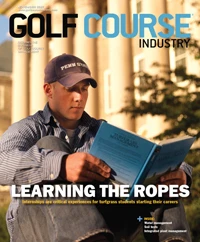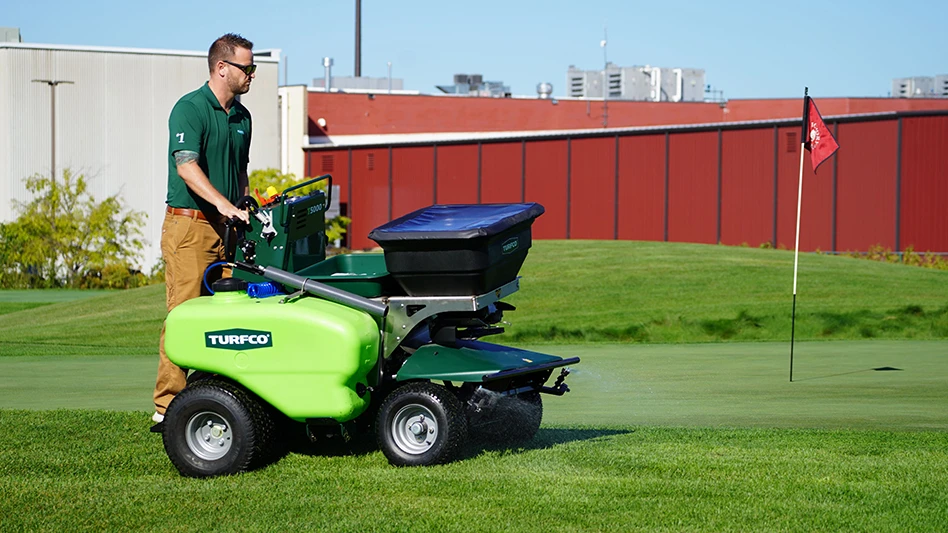David Hume, the 18th century Scottish philosopher, touted skepticism and the rejection of historically prevalent notions. Despite his heritage, he had obviously never heard of turfgrass management program internships.
Today, golf course superintendents widely agree working in the field in tandem with the classroom makes young men and women more marketable and better able to handle the rigors of the profession after college. Perhaps the only drawback of an internship is that it can be used as a source of cheap labor.
But these days, any good school takes precautions to ensure its programs aren’t sending students to be simple worker bees. Penn State University’s turf programs, which require an internship, is an example.
“I often preach, ‘Three things will get you a job: your grades, the school you graduated from and your work experience,’” says Andy McNitt, associate professor of soil science and turfgrass at Penn State’s College of Agricultural Sciences.
In the fall semester of 2007, there were 220 students in two- or four-year programs at Penn State, and there are far more requests for interns than there are students.
| TURFGRASS INTERNSHIP BENEFITS |
|
“Between their junior and senior years, we try to place students in a place that will help them with their careers,” McNitt says. “Most places offer housing as well as pay.”
While doing an internship for Penn State, students must have daily duties and complete a special project at the course that’s approved by the instructor, superintendent and student. Golf courses are vetted before a student works there.
“I can’t think of one downside to doing an internship,” McNitt says. “They’re going to work hard, long hours, and they find out if this is what they want to do. They should know that by now. By their junior year, if they don’t know that already, they’re behind.”
An internship is more than a mentoring program, McNitt says.
“They do what’s needed, but we expect the supervisor will have a mentor role and spend time and teach them a variety of things in bringing the student along,” he says. “We’re constantly revising the list of responsibilities of the supervisor so it’s not just a cheap labor train. Anyone who wants a Penn State intern can send a letter detailing the internship. Because housing is at a premium, that will increase the chances of getting one dramatically.”
Great opportunities
Tyler Bloom, a Penn State student who has completed two internships – one at the famed Merion Golf Club near Philadelphia and one at Southern Hills Country Club in Tulsa, Okla., for the PGA Championship this summer – says you have to give everything you’ve got every day.
“When you have the turf bug, you’re always talking about it,” he says. “It has to be a hobby for you to be successful and make it alive. You have to live, breathe and eat this stuff. You have to wake up with passion. You have to make it as perfect as you can.”
At Merion, Bloom’s job entailed daily tasks, including a lot of chemical spraying and hand-watering.
“Their expectations were the same on the West Course and the East Course,” he says. “Interns benefit from it. The operation at Merion is a great place for any intern who wants to see what it’s like maintaining a top 10 course. You learn about people skills and budgets, and you learn a lot about yourself. They push you to the extreme, and you learn how much you can take. It makes everything else in life easy.”
The Southern Hills operation was different than Merion because it involved preparation for a major.
“Some kids shy away from the tournament spotlight, but it’s great,” says Bloom, who’s on track to graduate in the spring of 2009. “You can’t get any better than a major championship. I’ll always remember how that course looked during that week. I know the closest thing to perfect and what’s expected at a top 30 course. It was great hearing what the players had to say.”
Even with two internships under his belt, Bloom is looking to complete a third one.
“I have so many great opportunities at hand,” he says. “It’s a great problem to have. I’m trying to pinpoint my weaknesses. I want to improve my weaknesses and find a place where I can work on them.”
Bloom can’t rate internships any more highly than he already does.
“Being exposed to how these guys motivate a staff of 25 to 50 guys every day to do their best job is the best thing about it,” he says. “Being a good manager is the most important thing. My previous bosses harped on that fact that being a good manager is as important as being a good agronomist. I promote internships as much as possible. I grew up more as a person than I did as a turf student. That’s going to help me later on.”
A lot of responsibility
After working at a course near Minneapolis in high school, Iowa State University senior Brad Johnson looked for a turf program where he could further his education. Now the president of Iowa State’s turf club, Johnson looks back fondly on his internship at the Links at Spanish Bay in Pebble Beach, Calif., where Jeff Steen is the golf course superintendent.
“It was the experience of a lifetime,” Johnson says. “During the drive out there, you’re wondering if you should have stayed in the Midwest. But I had to see what was out there. It was a lot more than I expected. It blew me away. They gave me a lot of responsibilities at a high-end course. They do 45,000 rounds a year and maintain the best quality turf. Their main concern is nematodes. It was great to learn about that stuff. (For example,) I’d never seen nematode damage in the Midwest.”
Johnson says he was involved with every aspect of the golf course. He also worked on a lot of special projects.
“Spraying, mowing, setup, bunker work – you name it, I did it,” he says. “It was an education and a learning experience.
“It’s one of the building blocks of success in turf management,” he adds. “It’s a building block for anyone in college. The way I look at it, it’s what everyone bases things on. If you work and have that reference and have a guy on your side, the possibilities are endless.”
Raising the bar
Phil Curran, assistant superintendent at the Stonewall Resort in Roanoke W.Va., vouches for what Johnson says. While attending an Ohio State University branch campus, he interned at the Pete Dye Golf
Club in Bridgeport, W.Va., in 1998 under superintendent Gary Grandstaff.
“It was very intense and fast paced,” Curran says. “There was a very wide spectrum of turf management with very high expectations. Gary spent a lot of time with me. I did everything.”
Curran says raising his overall performance level was challenging, even though he’d worked at an upscale public course in Ohio when he was younger. He says the mandatory internship was invaluable.
“It raised the level of my education,” he says. “There are different levels of internships. Some guys just mowed greens all summer, and that wasn’t good for them. But my guys worked with me and made it part of their daily schedule to teach me, and it helped me out long term.”
The real deal
Long term isn’t a worry for Zach Phillips, a 22-year-old Faulkner State Community College student studying golf course management. He works at Kiva Dunes Golf Club in Alabama as the assistant superintendent.
“It’s a full-time job,” he says. “I get to count my work experience as my internship. It’s the best of both worlds.”
Phillips, who expects to graduate after the spring semester next year, runs the day-to-day operations of the grounds, manages the crew and oversees all pesticide and fertilizer applications.
“In my first internship here, I was learning how to spray, what different products do, how to manage a crew effectively, and learning about grass types and weeds and how they react to fertilizers,” he says.
Though there are some things that are easier to learn in a classroom, such as the mechanics of soil, Phillips’ work experience has him ahead of his peers, he says.
“It’s unreal to see how much farther ahead I am than the other students who haven’t had the opportunity I have,” he says. “There are a lot of expectations here, so you have to learn things a lot faster. Because of that, you learn a lot more.”
While working on his internship, Phillips started as a crew member, then spray tech, then second assistant and now assistant. Superintendent Mike Rienzi is Phillips’ mentor.
“He doesn’t just tell me to do something,” Phillips says about Rienzi. “We talk about why it’s being done and the effects it’s going to have. He breaks everything down for me. And I get credit for it. I’ll finish all my turf classes this year, then two core classes next semester and I’ll be done.”
Phillips will continue to work at Kiva Dunes when he finishes school.
“I landed a job as an assistant so early in my career that I’m going to have to be an assistant for a while before I’m a superintendent,” he says. “That’s going to benefit me. There are some in the program who don’t know how much they’re missing by not doing an internship. Some guys, no matter how much you tell them, can’t see it.”
Teach them well
At Spring Hill Golf Club in Minneapolis, Tim Johnson makes it a point to bring on interns. The private club, a 1999 Tom Fazio design, has had an internship program since it opened.
“I did one (at Medinah Country Club in Chicago),” Johnson says. “It was one of the best experiences I had. The internship was influential in starting one here. Many of the guys who have done internships here have come back to work for me.”
Not only is an internship a tremendous resource for college students, it creates a reservoir of talented assistants.
“I’m up front with the guys,” he says. “They’re not coming here to sit on a mower. We teach them the things they need to know as assistants. The why’s and how’s of herbicides, calibration and application of fertilizers, and the proper setup of a golf course for daily play. We get them involved with irrigation and the renovation of a project or repair. Rarely will they sit on a mower. It’s not a source of cheap labor.”
Observing the ins and outs of a daily operation can be eye opening for interns.
“You don’t want to send a kid back to college with your name on his resume when he’s not ready for a spray technician’s job,” Johnson says. “We want them to be well prepared.” GCI
T.R. Massey is a freelance writer based in Columbus, Ohio. He can be reached at trm@columbus.rr.com.

Explore the November 2007 Issue
Check out more from this issue and find your next story to read.
Latest from Golf Course Industry
- Atlanta Athletic Club approves funding for master plan
- Maximizing Cultural Practices and Agronomic Benefits with Minimal Surface Disruption
- Real Answers about Spray Nozzle Choices
- From the Course to the Factory: How Customer Insights Drive Innovation
- New & Proven Enzyme Strategies for Sprayable Thatch Management
- Innovating Tomorrow: Wittek’s New Products & Industry Staples
- PBI-Gordon introduces new field development team
- The Cabot Collection announces move into course management






